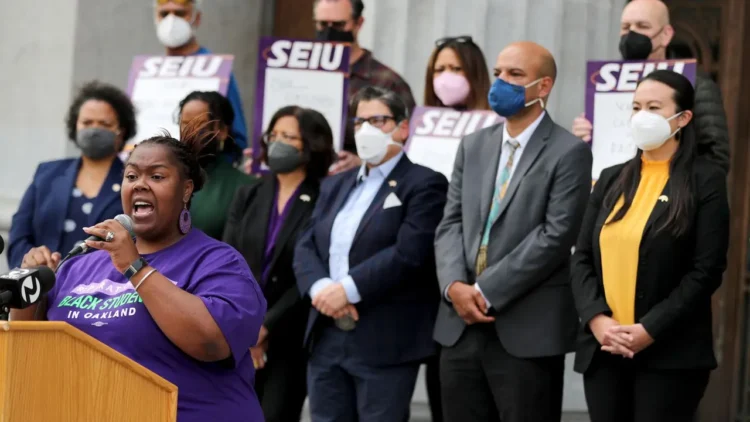By Dominic Taylor-
California’s nation’s taskforce on reparations for African Americans has detailed a report on Wednesday documenting the harms perpetrated by the state historically, and recommending steps to address those wrongs, including expanded voter registration, making it easier to hold violent police accountable and improving Black neighborhoods.
The report, released on Wednesday, offers a comprehensive look at the impacts of enslavement and generations of discrimination on Black Californians and Black Americans more broadly. The reports states that the damage to Black communities is broad, and that judicial decisions and racism by private actors has contributed to the exclusion of black people in many ways that have not been adequately addressed.
The California report covers not just the immediate impact of enslavement but also the harms of decades of political neglect, finding that there has been sustained damage to generations of Black Americans. The California report covers not just the immediate impact of enslavement but also the harms of decades of political neglect, finding that there has been sustained damage to generations of Black Americans.
A large section of the report focuses specifically on the expansion of the Ku Klux Klan in California, noting that in a 20-month period during the state’s “sizable and violent Klan resurgence” in the 1920s, California cities held more KKK meetings than Mississippi, Louisiana, North Carolina and Tennesse
The report includes testimony from experts and public meetings of the task force, as well as a comprehensive review of media articles, academic papers and historical documents. Members of the task force argue that the report is the most comprehensive look at the structural barriers Black Americans face since the 1968 Kerner Commission report.
The report adds that in some metrics, California not only matched discrimination across the country; at times it was a national leader.
Twenty-two years before the U.S. Supreme Court’s 1896 ruling in Plessy v. Ferguson established that racial segregation did not violate the Constitution, California’s Supreme Court upheld racial segregation in schools. The state remains one of the most segregated in the country for Black and Latino students.
The report recommends the creation of a special office that would, in part, help African Americans descended from free or enslaved Black people in the country at the end of the 19th century document their eligibility for financial restitution.“
Every state has some history of harm in the African American community,” said Kamilah Moore, a Los Angeles-based attorney and reparatory justice scholar who chairs California’s reparations task force. The nine-member task force, which a state law created in 2020, is charged with studying the impacts of enslavement on Black Californians and coming up with possible plans for restitution
The 500 page report will be the first government-commissioned study on the historical harms committed against the African American community since the 1968 Kerner Commission report ordered by President Lyndon Johnson, the taskforce chair, Kamilah Moore, said.
Demands for reparation by African American communities in the past has led to endless debates over the idea, given the general absence of a plausible approach to implement reparations across all the communities calling for them. Concerns have been expressed by analysts that the implementation of reparations to one group of affected Africans will be demanded by all groups all over the world.
However, the new set of recommendations in California will provide an interesting assessment of how practical they are, and how widespread they can be applied if practical.
“I hope that this report is used not only as an educational tool, but an organizing tool for people not only in California but across the US to educate their communities,” she said, adding that the report also highlights “contributions of the African American community and how they made the United States what it is despite ongoing oppression and degradation”.
Gavin Newsom, the governor of California, signed legislation creating the taskforce in 2020, making California the only state to move ahead with a study and plan. Cities and universities are taking up the cause with the Chicago suburb of Evanston, Illinois, becoming the first US city to make reparations available to Black residents last year.
The taskforce voted in March to limit reparations to descendants, overruling reparations advocates who want to expand compensation to all Black people in the US.
The report, to be released by the state Department of Justice, marks the halfway point for the two-year taskforce’s work. The draft report does not provide a comprehensive reparations plan, which is due to lawmakers next year.
The report is expected to lay out how California supported slavery before it was technically abolished and oppressed Black residents through discriminatory laws and practices in education, home ownership, employment and the courts.
Although California was a “free” state, an estimated 1,500 enslaved African Americans lived in the state in 1852, according to the draft report. The Ku Klux Klan flourished in California with members holding positions in law enforcement and city government. African American families were forced to live in segregated neighborhoods that were more likely to be polluted.
Moore said that a state Office of African American or American Freedmen Affairs could help African American residents file claims and trace their lineage to prove eligibility for individual restitution.
The taskforce in its draft report also recommends compensating people who were forced out of their homes for construction projects such as parks and highways and general renewal, as happened to San Francisco’s historically Black and once-thriving Fillmore neighborhood.
“Other groups that have suffered exclusion, oppression and downright destruction of human existence have received reparations, and we should have no less,“ said the Rev Amos Brown, the committee’s vice-chair and pastor of Third Baptist church in the Fillmore District.




